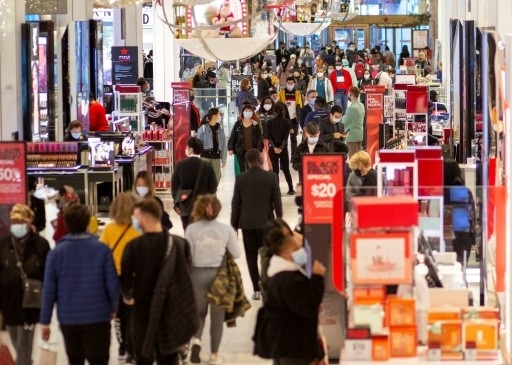U.S. retailers cheery about holiday season despite inflation

After nearly two years of pandemic gloom, American consumers appear primed to spend generously for the holidays in spite of worries over inflation and item availability.
Retailers have seen strong buying interest this fall, with robust "back to school" and Halloween sales fueling optimism about the holiday season, which kicks off this week with "Black Friday."
"All indications are that U.S. consumers are looking to celebrate the holiday season," Target Chief Executive Brian Cornell said last week. "They are anxious to get together with family and friends."
But gasoline prices are up more than 60 percent from a year ago, while this year's Thanksgiving feast will cost an estimated 14 percent more, according to the American Farm Bureau Federation, an agricultural lobbying group.
Shortages are another worry.
In earnings conference call over the last week, Target, Walmart and other big-box retailers offered reassurances that they'd have sufficient inventories after recent concerns that supply chain snafus would leave Christmas stockings empty.
But there will certainly be gaps, with popular game consoles and some high-demand electronics products from Apple and other companies seen as especially hard to find. Customers "may not be finding their first choice," said Foot Locker Chief Executive Richard Johnson.
"If their size, color, style doesn't happen to be available, they've shown a real propensity to continue to shop, work with our associates in the store and find the next best product."
Worries about shortages began building significantly in October, when the White House announced an initiative to shift key supply chain infrastructure to 24-hour service following delays at West Coast ports.
Since that time, there have been some signs of progress. The Port of Los Angeles last week reported a 35 percent drop in the number of containers that have dwelled there for nine or more days.
But the port is only one source of the trouble, notes Jen Blackhurst, a professor at the University of Iowa specializing in supply chain issues.
She warns that customers may notice gaps at stores or encounter trouble with orders that don't arrive in time due to labor issues like a lack of truck drivers. "I don't think there are going to be massive shortages," she said. "But I don't think it's going to be a normal holiday season."
The National Retail Federation projects holiday sales will grow between 8.5 percent and 10.5 percent, noting that a "stellar" season rests in part on whether retailers can replenish merchandise that runs out.
Retailers have taken extraordinary steps this season, such as importing and storing items earlier than usual, ordering shipments by air freight and in some cases even chartering their own vessels.
"We have figured out a way," said Ernie Herrman, chief executive of TJ Maxx parent TJX.
Herrman has described a "surgical" approach to raising prices on some goods, while both Walmart and Target have said they do not expect to pass on all cost increases to consumers.
But Williams-Sonoma, which owns the namesake kitchen wares company as well as upscale chains like Pottery Barn, has phased out website-wide promotions, while Macy's has been selling more goods at full price. Higher prices are also appearing in e-commerce, which Adobe estimates could account for as much as 25 percent of holiday spending this year.
In October 2021, online prices were up 1.9 percent year over year, the 17th straight month of inflation since June 2020 and a marked shift from the pre-pandemic era when online prices reliably fell, according to Adobe's digital price index.
"You've had the conventional wisdom that's its always available and it's always cheaper online," Vivek Pandya, a lead analyst for Adobe. "And that's what's getting turned on its head in the pandemic."
Neil Saunders, an analyst at consultancy GlobalData Retail, warned that inflation "is very eroding to peoples' ability to spend," although he expects more of a drag in 2022 compared with this December.
One thing that won't derail the U.S. shopping season is COVID-19, Saunders predicted, citing the lack of appetite to undertake restrictions comparable to those in Europe. "A lot of people will say 'enough is enough,'" he said.
